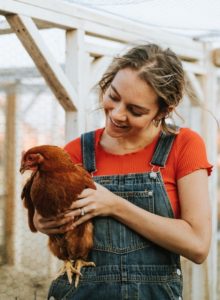Smallholders’ Handbook part 3

Here is our third instalment about joining the Good Life and living off the land with a sustainable smallholding.
At BigBarn we would love to promote thousands of profitable smallholdings on our UK Food Map, reconnecting people with where their food comes from and helping build inclusive, sustainable, communities around food.
To help here is the third of 12 extracts from Lorraine Turnbull’s book The Sustainable Smallholders’ Handbook
Learning the Ropes.
I have met thousands of successful rural business people and they all have certain things in common. They all have a sense of humour (you need one in this business); a sense of their own worth; a pride in what they do; and the ability to look at situations level-headedly. Every one of them has worked hard and made sacrifices for their success.
But if I asked them all to define their strengths and weaknesses they would all have a different answer. Some are great at maths, some are terrible at maths. Some have really embraced technology, some are wonderful communicators and terrific with people. They are all human and unique, and there is no single skillset to ensure success.
 Working out your own strengths and weaknesses is an essential precursor to starting a new life in which you will be, for the most part, on your own, so you can get a good idea of how and whether you’ll cope by carrying out a good old-fashioned SWOT analysis… on yourself. You may feel a little self-conscious, but if undertaken seriously this is a really useful exercise and the resulting document should be kept alongside your business plan. So here we go.
Working out your own strengths and weaknesses is an essential precursor to starting a new life in which you will be, for the most part, on your own, so you can get a good idea of how and whether you’ll cope by carrying out a good old-fashioned SWOT analysis… on yourself. You may feel a little self-conscious, but if undertaken seriously this is a really useful exercise and the resulting document should be kept alongside your business plan. So here we go.
Strengths: What you do well? What are your resources (buildings, equipment etc)? What support do you have?
Weaknesses: What should you avoid? What do you need training in? What’s going to hold you back?
Opportunities: Does your product fit any trends? Is there anything similar to your product on the local market? Will any emergent technology help you?
Threats: Who is your competition? Are there any changes in the law/technology that will negatively affect your product idea? Are your resources adequate for what you plan to do?
Specialised training
 Specialised training in (sometimes literally) the nuts and bolts of the business is often best provided by fellow smallholders who generate additional revenue by sharing their wisdom with neophytes, and whose number you may very well join one day. Sometimes private trainers are the only way you can access training of this sort, and you may very well find that if it’s in-depth training in a specific craft that you’re after, you have to go to several platforms to acquire it.
Specialised training in (sometimes literally) the nuts and bolts of the business is often best provided by fellow smallholders who generate additional revenue by sharing their wisdom with neophytes, and whose number you may very well join one day. Sometimes private trainers are the only way you can access training of this sort, and you may very well find that if it’s in-depth training in a specific craft that you’re after, you have to go to several platforms to acquire it.
To choose an example of which I have personal experience, if you want to set up a small-scale cidermaking enterprise, you will need a thorough operating knowledge of:
Arboriculture and orchard management
The cidermaking process itself
Liquor licensing, excise duty, planning, and compliance issues
Marketing & social media
Book-keeping and business administration
No single centre in Britain offers a course with all these as modules, so you will have to do a bit of research.
Tempted? You can read more over the next few months or buy Lorraine Turnbull’s book The Sustainable Smallholders’ Handbook available here